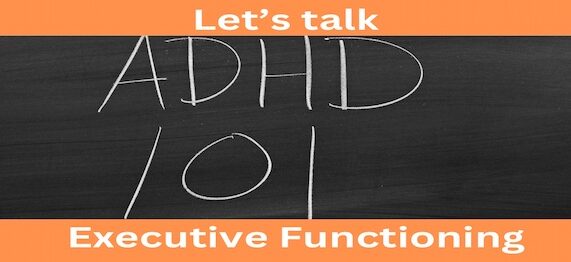
Written by Jennifer Cox LCPC
ADHD is a neurodevelopment disorder. When we talk about ADHD, it isn’t just a disorder that lacks attention or has impulsive tendencies, there is so much that occurs behind the scenes with our executive functioning.
It is a term that covers a variety of skills and cognitive processes that allow us to function – They involve cognitive and behavioral skills that regulate us and guide us throughout our day.
So, what does executive functioning mean?
*Response Inhibition
The capacity to think before you act – The ability to resist the urges – It allows the time to step back and observe before we engage
Example of daily impact: You may jump from task to task or stop the task to pursue something that came to your mind
*Working memory
The ability to hold information in memory while performing complex tasks – It allows one to utilize past experiences and apply to current situations
Example of daily impact: You lose track of things that you wanted to accomplish
*Sustained attention
The capacity to maintain attention to a situation or task in spite of distractions or boredom
Example of daily impact: Once you start something, you find it difficult to keep the end in sight and have trouble seeing the task through to completion
*Organization
The ability to create and maintain systems to keep track of information or materials
Example of daily impact: Often forgetting to take the things you need because they weren’t returned to the place they go
*Time management
The capacity to estimate how much time one has, how to allocate it, and how to stay within time limits – This skill involves a range of executive functioning such as goal setting, prioritizing, planning, etc.
Example of daily impact: Due to time blindness one tends to put things off because they think they can do them in a shorter timeframe than is truly needed
*Emotional control/Stress tolerance
The ability to manage emotions in order to achieve goals, complete tasks, or control behavior
Example of daily impact: When things all come in at once, it adds up, you may not be able to tolerate and become irritable, having troubles moving past the emotions and towards the goal
*Flexibility
The ability to revise plans in the face of obstacles, setbacks, new information, or mistakes – To be adaptable to changing situations
Example of daily impact: You may be set in your ways and when plans don’t occur as you thought, you may become stuck unable to move on to another plan
*Metacognition
The ability to stand back and take a look at oneself in a situation. It includes self-monitoring and evaluation – To observe how you problem solve – To be able to answer questions such as ‘How did I do?’
Example of daily impact: When you can’t figure out what to do next after evaluating a situation, not knowing the barriers that might get in the way
*Planning and prioritizing
The ability to create a plan to reach a goal or to complete small tasks that lead to the overall goal – The ability to make decisions about what should be focused on at that moment
Example of daily impact: When one just jumps into a task without any planning, this could lead to not having all that is needed for the task, so disruptions happen – Since all tasks are rated equally important, prioritizing is troublesome
*Goal directed persistence
The capacity to have a goal, follow through, and not get distracted by competing interests
Example of daily impact: Someone with ADHD lives in the moment, so goals aren’t always necessary for that mindset – Following a schedule doesn’t seem ideal and doesn’t feel right
*Task initiation
The ability to begin projects without undue procrastination, in an efficient or timely manner
Example of daily impact: When feeling stuck, can’t work up the energy to initiate
Understanding the above skills and how they can impact your day to day, can help one understand why ADHD is a serious disorder since this is a disorder that involves self-control, self-care, self-regulation, and self-motivation to get through your day.
If you’re struggling with your mental health, don’t hesitate to seek help from a professional –
Reaching out for support is an important step in prioritizing your well-being.
By working together, we can create a world where mental health is valued and
all individuals have access to the care and resources they deserve.
Reach out today at info@echcounseling.com or 815-363-0864

